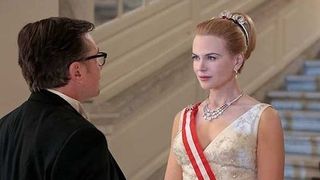Cannes 2014: Grace Of Monaco reaction review
Nicole Kidman becomes Hitchcock's best blonde...

“ The following events are a fictional account inspired by real events” is the text that opens Grace Kelly biopic Grace Of Monaco , and it’s enough to set alarm bells ringing.
What it should really say is “The following is a simplified, sanitised account inspired by real events”, for while Olivier Dahan’s film is by no means a dog of the Diana variety, it is frustratingly superficial and speckled with cod-psychology and unintentional humour.
Opening in LA in 1956, when Kelly is the toast of Tinseltown and Hitchcock’s favourite blonde, Dahan’s soapy drama quickly hops to Monaco in 1961.
The actress is now married to Prince Rainier (Tim Roth, oddly opting for a clipped English accent) but her relationship is on the rocks, her public image is that of an uncouth, meddling outsider, and Monaco’s principality is under threat as President de Gaulle demands Rainier pay taxes or face a crippling trade blockade, like he’s just pitched up from The Phantom Menace .
Then Hitchcock comes a-calling with the script to Marnie . Can Kelly be both a princess and an actress? Will the already critical public accuse her of deserting her marriage and humanitarian duties if she returns to Hollywood? Or should she say “no” to dear old Hitch (here portrayed by Roger Ashton Griffiths as an avuncular teddy bear) and instead nail the trickiest role of her life: People’s Princess?
There are things to enjoy in Grace of Monaco , but they’re mostly eye candy: exotic, sun-dappled locales, glinting jewellery, immaculately coiffured hair, lavish set designs. Kidman has the requisite icy beauty to play Kelly, and does what she can with the thin material – though any thoughts of a tilt at a second Oscar for a role that, on paper, seems like an award magnet, are truly evaporated 20 minutes in.
Where Dahan’s movie lacks any sort of grace is in its drama. Striving to blend the personal and political while offering themes of role-playing, illusion vs reality and celebrity culture, it favours on-the-nose exposition over subtlety, nuance and knottiness.
Sign up for the Total Film Newsletter
Bringing all the latest movie news, features, and reviews to your inbox
The Algerian war wafts obscurely in the background, de Gaulle (Andre Penvern) cuts an inadvertently humorous figure, part Monsieur Hulot, part ‘Allo ‘Allo! (“You agree my terms by tonight or I send Monaco back into the Dark Ages!”), and Parker Posey, as a devious assistant, sets her face to auto-shrew.
The Hollywood insight, meanwhile, is kept at the edges of the frame, screenwriter Arash Amel perhaps feeling the familiar shadow of Hitch need not shroud his film after the recent biopics Hitchcock and The Girl.
It’s easy to see why the Cannes Film Festival chose to open with Grace Of Monaco given the close-to-home story and Hollywood star power, but god only knows what French critics made of watching thesps spittle-spray their accent while speaking their lines in English. The boos and claps at the end of the screening never got going, so it’s likely the reaction was universal: meh.
Jamie Graham is the Editor-at-Large of Total Film magazine. You'll likely find them around these parts reviewing the biggest films on the planet and speaking to some of the biggest stars in the business – that's just what Jamie does. Jamie has also written for outlets like SFX and the Sunday Times Culture, and appeared on podcasts exploring the wondrous worlds of occult and horror.
Most Popular



